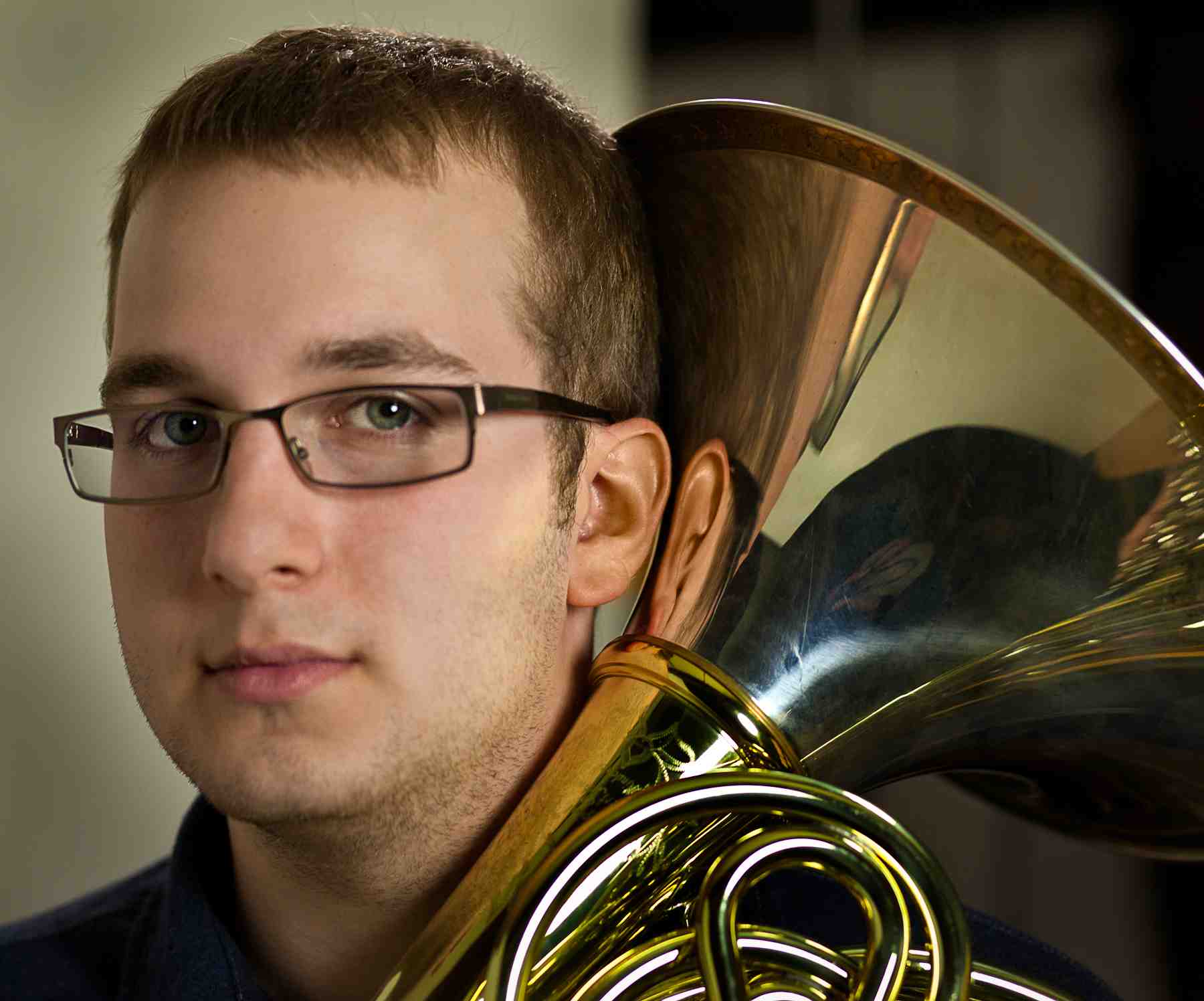
School of Music Senior Steven Cohen will present at the 2013 International Horn Symposium (IHS) in Memphis, Tenn, on Aug. 1.
His presentation is titled “From ON stage to UNDER it: Transforming from an Orchestral to Pit Hornist and Back” and will provide a look into the world of professional pit/Broadway horn playing.
It is rare for an undergraduate to present at this conference, sponsored by the International Horn Society.
“It is very uncommon for an undergraduate student to present at the IHS,” said Associate Professor of Horn Alan Mattingly. “Occasionally a graduate student will give a presentation, but by and large, only professional horn players and teachers at the peak of their careers are chosen to present.”
Cohen grew up in Great Neck, N.Y. He began studying at Mannes College The New School for Music, but took leave in May 2010 to join the touring production of “The 25th Anniversary Production of Les Misérables.” He performed as principal horn there from November 2010 to January 2012 until he began studying at UNL.
The production was a special one for Cohen, who was introduced to “Les Misérables” when he was 11 years old.
“I fell in love with the show immediately,” Cohen said. “My dream job from that point on was to play the show.”
A contractor hires touring musicians. His wife, Jill (Bartels) Cohen (B.M. 2005), who is also a horn player, had connections that led to their hiring for the “Les Misérables” touring production.
“I remember I was at work when my wife got the phone call from the contractor asking if we were interested,” Cohen said. “I about had a heart attack. The show is something that had been a part of me since I was 11. I sadly lost my father when I was 14 after a long battle with an illness he had. That show really carried me through the loss. There are instances on tour that I literally would just start crying because the show is just that powerful.”
Mattingly said Cohen is a “fantastic” horn player.
“He has performed in a wide variety of musical settings, including a full-time tour with the 25th Anniversary Production of Les Misérables,” Mattingly said. “He is also an active freelancer in the area, playing numerous productions in Lincoln and Omaha. He is definitely not the ‘typical’ undergraduate student. Steven can offer great insight to horn players about the differences between playing on stage with an orchestra and playing under the stage in the pit of a musical production.”
While they share some similarities, playing in a pit orchestra offers some challenges not typically found in the orchestral setting.
“There are a lot of varying styles that you’re asked to do within the pit setting that you’re not asked to do in the orchestral setting normally,” Cohen said. “Also the way that the horn is used in the pit, because of its unique versatility, your part could be a horn part, but you could also be filling in the role of second trumpet or third saxophone.”
Playing in the pit also typically means more playing.
“One of the differences I like to point out is the time that you’re going to be spending playing,” Cohen said. “Most orchestra concerts are two hours in length with an intermission, and you play them three or four times per week at the most. With a show, you’re looking at playing eight times a week for three hours at a time with two shows on Saturday and Sunday. Your body is utilized differently. The physicalness of keeping up with it, especially with your chops, is very scary.”
Another difference is the number of people that you work with.
“You go from the orchestral setting of working with 100 people to the pit orchestra, which is typically much smaller. The most I’ve worked with in a pit was ‘South Pacific,’ and that was 22 people,” Cohen said. “What’s asked of you within your part is a lot more. You’re dealing with smaller numbers, so you have to create a big deal of sound.”
But Cohen has a passion for playing in the pit.
“People don’t think about it much. You listen to show tunes on the radio, but what went into that?” Cohen said. “That’s what pushed me to do this.”
He also appreciates having the opportunity to change people’s lives through music.
“This music has the ability to transform people. The emotional experience is there,” Cohen said. “Even if you’re an amateur horn player, there are so many things you can do to really give a full performance because you’re part of what’s going on. It’s not just what’s happening on stage. You, as a player, especially if it’s a really significant horn part, have moments in that horn part that drive the entire show. It was my job at ‘Les Mis’ to bring those moments to life because when it was our time to shine, we had to really shine.”
But he also believes there is no such thing as a perfect performance.
“You can play every note, every single way you want to, but there’s a whole other spectrum because of what’s happening on stage,” Cohen said.
Cohen strives to get that emotional reaction from the audience.
“That’s a complete performance for me,” Cohen said. “It’s understanding yourself as a musician and bringing your feelings forward through your playing. It’s painting a picture of what’s happening on stage through your playing.”